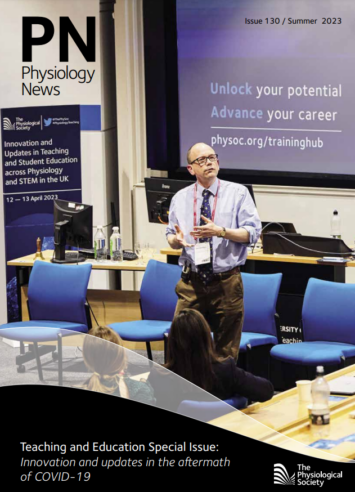
Physiology News Magazine
Is simulation the ultimate integrated physiological experience?
News and Views
Is simulation the ultimate integrated physiological experience?
News and Views
https://doi.org/10.36866/pn.130.16
Professor Rachel Ashworth & Dr Lauren White
Clinical Skills and Simulation Centre, University of Worcester, UK
An understanding of physiology is a core part of any medical training and key for the development of critical thinking and clinical reasoning skills. Research has shown that the construction and application of physiological knowledge by medical students changes as their expertise increases, so learning activities within curricula should be designed to reflect this (Bandiera et al., 2018).
Supporting student learning
Learning is achieved in a variety of settings using different teaching approaches adapted to suit the needs of students at the appropriate level of their educational journey. For example, undergraduate students that have arrived straight from school may need support to understand core physiological concepts while postgraduate students may well have learned physiology at degree level but are now applying knowledge in different contexts. Constructing effective learning environments to support student learning can be challenging and thus guidance from pedagogical research to assess educational activities, in the context of medical education, is often beneficial.
The General Medical Council (GMC) sets out the requirements for learning that newly qualified medical graduates must demonstrate (Outcomes for graduates, 2018). Within this framework, driven partly by a concern that opportunities for physiology teaching in medical courses are becoming increasingly limited, there is also a physiology curriculum to support those responsible for teaching medical students (The Physiological Society, 2020). Taken together these documents provide a comprehensive outline of the types of physiological knowledge and skills that medical students must acquire during their degree.
One example, taken from cardiovascular medicine, is that newly qualified doctors must have a knowledge and understanding of the electrocardiogram (ECG) and be safe to practise under indirect supervision. Interpreted another way, this can be explained as knowing how to do the skill (i.e., the practical skill of conducting an ECG), what that skill represents (i.e., how the trace relates to cardiac function) and why it is used, integrating the skill into clinical practice (i.e., when is it appropriate to conduct an ECG in practice).
Simulation vs traditional clinical teaching
The Three Counties Medical School, University of Worcester, is embedding simulation into the early years teaching on its four-year graduate MBChB programme. Immersive simulation (SIM-based education, SBE) is already used widely in healthcare training, and there is evidence that it is superior to traditional clinical teaching, in that it improves teamworking and interprofessional collaboration and reduces patient harm.
SBE has been shown to be effective in training undergraduates, postgraduates and faculty and is well liked by educators and learners (McGaghie WC et al., 2010). However, SBE is sometimes seen as expensive and resource heavy, and it is argued that traditional clinical skills, namely the separation of practical skills from integration of knowledge, can be just as effective in delivering the same educational outcomes, especially in the early years and on undergraduate courses. Our MBChB course provides the opportunity to assess the effectiveness of these two different approaches, simulation versus traditional clinical skills teaching, when applied to learning the ECG within the early years of a graduate course. Once established, our aim is to evaluate a variety of different skills to assess how best to support student learning. Having the option to select approaches based on evidence from pedagogical research is critical to designing strategies that best support medical student learning.
References
Bandiera G et al. (2018) Back from basics: integration of science and practice in medical education. Medical Education 52 (1), 78-85
Outcomes for graduates (2018). https://www.gmc-uk.org/education/standards-guidance-and-curricula/standards-and-outcomes/outcomes-for-graduates/outcomes-for-graduates
The Physiological Society (2020). Objectives for Medical Students. https://www.physoc.org/policy/highereducation/supporting-medical-education/
McGaghie WC et al. (2010). A critical review of simulation-based medical education research: 2003-2009. Medical Education 44 (1), 50-63.
